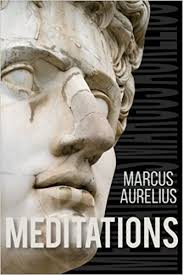Meditations Page #29
Meditations is a series of personal writings by Marcus Aurelius, Roman Emperor from 161 to 180 AD, recording his private notes to himself and ideas on Stoic philosophy. Marcus Aurelius wrote the 12 books of the Meditations in Koine Greek as a source for his own guidance and self-improvement.
XXXI. As one who had lived, and were now to die by right, whatsoever is yet remaining, bestow that wholly as a gracious overplus upon a virtuous life. Love and affect that only, whatsoever it be that happeneth, and is by the fates appointed unto thee. For what can be more reasonable? And as anything doth happen unto thee by way of cross, or calamity, call to mind presently and set before thine eyes, the examples of some other men, to whom the self-same thing did once happen likewise. Well, what did they? They grieved; they wondered; they complained. And where are they now? All dead and gone. Wilt thou also be like one of them? Or rather leaving to men of the world (whose life both in regard of themselves, and them that they converse with, is nothing but mere mutability; or men of as fickle minds, as fickle bodies; ever changing and soon changed themselves) let it be thine only care and study, how to make a right use of all such accidents. For there is good use to be made of them, and they will prove fit matter for thee to work upon, if it shall be both thy care and thy desire, that whatsoever thou doest, thou thyself mayst like and approve thyself for it. And both these, see, that thou remember well, according as the diversity of the matter of the action that thou art about shall require. Look within; within is the fountain of all good. Such a fountain, where springing waters can never fail, so thou dig still deeper and deeper. XXXII. Thou must use thyself also to keep thy body fixed and steady; free from all loose fluctuant either motion, or posture. And as upon thy face and looks, thy mind hath easily power over them to keep them to that which is grave and decent; so let it challenge the same power over the whole body also. But so observe all things in this kind, as that it be without any manner of affectation. XXXIII. The art of true living in this world is more like a wrestler's, than a dancer's practice. For in this they both agree, to teach a man whatsoever falls upon him, that he may be ready for it, and that nothing may cast him down. XXXIV. Thou must continually ponder and consider with thyself, what manner of men they be, and for their minds and understandings what is their present estate, whose good word and testimony thou dost desire. For then neither wilt thou see cause to complain of them that offend against their wills; or find any want of their applause, if once thou dost but penetrate into the true force and ground both of their opinions, and of their desires. 'No soul (saith he) is willingly bereft of the truth,' and by consequent, neither of justice, or temperance, or kindness, and mildness; nor of anything that is of the same kind. It is most needful that thou shouldst always remember this. For so shalt thou be far more gentle and moderate towards all men. XXXV. What pain soever thou art in, let this presently come to thy mind, that it is not a thing whereof thou needest to be ashamed, neither is it a thing whereby thy understanding, that hath the government of all, can be made worse. For neither in regard of the substance of it, nor in regard of the end of it (which is, to intend the common good) can it alter and corrupt it. This also of Epicurus mayst thou in most pains find some help of, that it is 'neither intolerable, nor eternal;' so thou keep thyself to the true bounds and limits of reason and give not way to opinion. This also thou must consider, that many things there be, which oftentimes unsensibly trouble and vex thee, as not armed against them with patience, because they go not ordinarily under the name of pains, which in very deed are of the same nature as pain; as to slumber unquietly, to suffer heat, to want appetite: when therefore any of these things make thee discontented, check thyself with these words: Now hath pain given thee the foil; thy courage hath failed thee. XXXVI. Take heed lest at any time thou stand so affected, though towards unnatural evil men, as ordinary men are commonly one towards another. XXXVII. How know we whether Socrates were so eminent indeed, and of so extraordinary a disposition? For that he died more gloriously, that he disputed with the Sophists more subtilty; that he watched in the frost more assiduously; that being commanded to fetch innocent Salaminius, he refused to do it more generously; all this will not serve. Nor that he walked in the streets, with much gravity and majesty, as was objected unto him by his adversaries: which nevertheless a man may well doubt of, whether it were so or no, or, which above all the rest, if so be that it were true, a man would well consider of, whether commendable, or dis-commendable. The thing therefore that we must inquire into, is this; what manner of soul Socrates had: whether his disposition was such; as that all that he stood upon, and sought after in this world, was barely this, that he might ever carry himself justly towards men, and holily towards the Gods. Neither vexing himself to no purpose at the wickedness of others, nor yet ever condescending to any man's evil fact, or evil intentions, through either fear, or engagement of friendship. Whether of those things that happened unto him by God's appointment, he neither did wonder at any when it did happen, or thought it intolerable in the trial of it. And lastly, whether he never did suffer his mind to sympathise with the senses, and affections of the body. For we must not think that Nature hath so mixed and tempered it with the body, as that she hath not power to circumscribe herself, and by herself to intend her own ends and occasions. XXXVIII. For it is a thing very possible, that a man should be a very divine man, and yet be altogether unknown. This thou must ever be mindful of, as of this also, that a man's true happiness doth consist in very few things. And that although thou dost despair, that thou shalt ever be a good either logician, or naturalist, yet thou art never the further off by it from being either liberal, or modest, or charitable, or obedient unto God. XXXIX. Free from all compulsion in all cheerfulness and alacrity thou mayst run out thy time, though men should exclaim against thee never so much, and the wild beasts should pull in sunder the poor members of thy pampered mass of flesh. For what in either of these or the like cases should hinder the mind to retain her own rest and tranquillity, consisting both in the right judgment of those things that happen unto her, and in the ready use of all present matters and occasions? So that her judgment may say, to that which is befallen her by way of cross: this thou art in very deed, and according to thy true nature: notwithstanding that in the judgment of opinion thou dust appear otherwise: and her discretion to the present object; thou art that, which I sought for. For whatsoever it be, that is now present, shall ever be embraced by me as a fit and seasonable object, both for my reasonable faculty, and for my sociable, or charitable inclination to work upon. And that which is principal in this matter, is that it may be referred either unto the praise of God, or to the good of men. For either unto God or man, whatsoever it is that doth happen in the world hath in the ordinary course of nature its proper reference; neither is there anything, that in regard of nature is either new, or reluctant and intractable, but all things both usual and easy.
Translation
Translate and read this book in other languages:
Select another language:
- - Select -
- 简体中文 (Chinese - Simplified)
- 繁體中文 (Chinese - Traditional)
- Español (Spanish)
- Esperanto (Esperanto)
- 日本語 (Japanese)
- Português (Portuguese)
- Deutsch (German)
- العربية (Arabic)
- Français (French)
- Русский (Russian)
- ಕನ್ನಡ (Kannada)
- 한국어 (Korean)
- עברית (Hebrew)
- Gaeilge (Irish)
- Українська (Ukrainian)
- اردو (Urdu)
- Magyar (Hungarian)
- मानक हिन्दी (Hindi)
- Indonesia (Indonesian)
- Italiano (Italian)
- தமிழ் (Tamil)
- Türkçe (Turkish)
- తెలుగు (Telugu)
- ภาษาไทย (Thai)
- Tiếng Việt (Vietnamese)
- Čeština (Czech)
- Polski (Polish)
- Bahasa Indonesia (Indonesian)
- Românește (Romanian)
- Nederlands (Dutch)
- Ελληνικά (Greek)
- Latinum (Latin)
- Svenska (Swedish)
- Dansk (Danish)
- Suomi (Finnish)
- فارسی (Persian)
- ייִדיש (Yiddish)
- հայերեն (Armenian)
- Norsk (Norwegian)
- English (English)
Citation
Use the citation below to add this book to your bibliography:
Style:MLAChicagoAPA
"Meditations Books." Literature.com. STANDS4 LLC, 2025. Web. 26 Feb. 2025. <https://www.literature.com/book/meditations_76>.








Discuss this Meditations book with the community:
Report Comment
We're doing our best to make sure our content is useful, accurate and safe.
If by any chance you spot an inappropriate comment while navigating through our website please use this form to let us know, and we'll take care of it shortly.
Attachment
You need to be logged in to favorite.
Log In